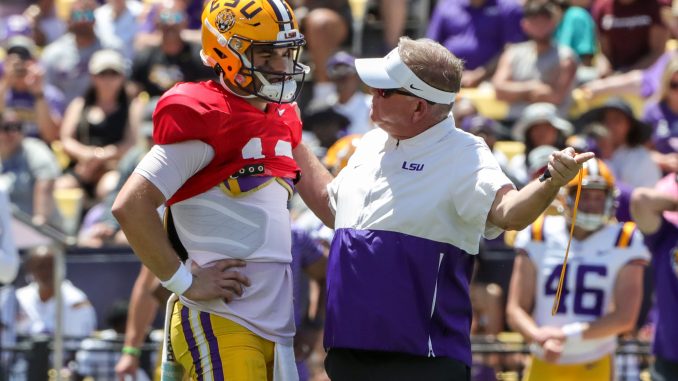
By GLENN GUILBEAU, Tiger Rag Editor
Last Saturday night after LSU’s sloppy and lucky, but swashbuckling, 36-33 win at South Carolina that afternoon, CBS Sports columnist John Talty wrote the following sentence after correctly criticizing the Tigers’ play under coach Brian Kelly:
“Multiple industry sources familiar with LSU told CBS Sports on Saturday they believe the on-field issues are a result of a disconnect between Kelly and his players, with his style not resonating as well in Baton Rouge as it did in South Bend.”
Talty is a great writer and excellent reporter. And I believe his reporting and writing in the piece at question is accurate. His mistake is thinking that a “disconnect” between coach and players is so important. It often isn’t.
Kelly, who left Notre Dame after the 2021 season for LSU, is about to turn 63 next month. Most of his players are between the ages of 18 and 22 years old. How much can he really connect with them? Younger assistant coaches can handle that, not a CEO head coach from Boston like Kelly, who doesn’t mince words and is refreshingly these days is more taskmaster than player’s coach.
College players are getting paid handsomely now, and they can leave for another school at virtually a moment’s notice. So they should be able to deal with a little disconnect here and there more now than ever in the history of college football. Many are not only spoiled brats now. They’re spoiled and well-paid brats.
In the classic movie “Pulp Fiction,” John Travolta’s overly sensitive Vincent Vega has to deal with a taskmaster named Wolf, played by Harvey Keitel. Wolf is blunt with Vega as he tries to get him to finish a risky job quickly, and he hurts Vega’s feelings. For our purposes, Travolta is an LSU player disconnected with Kelly. Keitel is Kelly.
“If I’m curt with you, it’s because time is a factor,” Keitel says. “I think fast, I talk fast, and I need you guys to act fast, if you want to get out of this. So, pretty please … with sugar on top. Clean the (bleeping) car.”
I can hear Kelly now with a player. “So, pretty please … with Tony Chachere’s on top. Clean up the (bleeping) penalties.”
Not every coach can be Uncle Les Miles or Fraternity Brother Ed Orgeron. Yes, each of those won national championships at LSU with frequently friendlier and more connected relationships with players. But in the end, each were shown the door as they got a little too connected and casual with their players and started losing a lot. They also had better players when they were winning than Kelly does now, and Kelly did inherit a mess. He’ll eventually win a national championship or two if he recruits better and, more importantly, if LSU can get more money people and configure NIL better.
But as far as the disconnect part, players don’t have to have love connections with their coaches to play well for them. They can learn to love their coaches later after they’re done playing for them and making millions in the NFL. That’s how it was with Nick Saban.
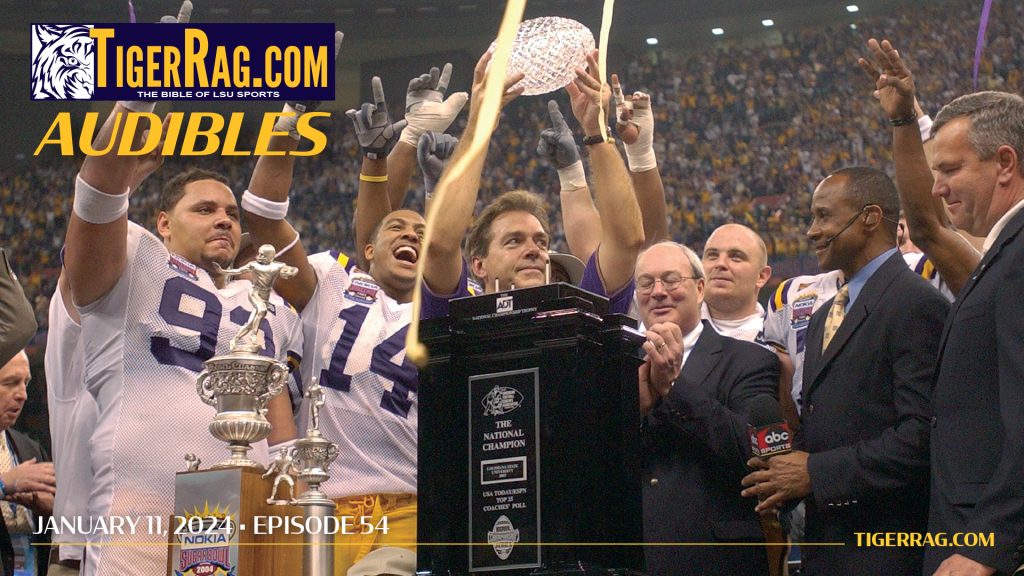
Saban didn’t always connect with all his players. But he always coached them what to do better than anyone. While he was at LSU, great players like linebacker Bradie James and safety Craig Steltz did not like Saban very much. James won an SEC title under Saban in 2001. Steltz won a national championship with Saban at LSU in the 2003 season. Each were great players and probably would’ve made the NFL anyway, but each owes much to Saban. When James was making millions with the Dallas Cowboys, he spent more time at Alabama events with Saban than he did at LSU.
James learned what many of us learn about that hard-ass teacher we had in high school. We liked the other cooler teacher who let us have discussions in class instead of grinding through the textbook. But while in college and thriving in the subject that the tough teacher taught, we realized we learned more from the Type A, Kelly-Saban-like guy.
There are likely many Alabama players who didn’t love Saban, but we never heard much about it as Saban was winning six more national titles with the Crimson Tide from 2009-20 before retiring. Now, everybody loves him.
Saban and some members of his staff also had trouble in his early years at LSU with reaching players as well in Baton Rouge as they had in previous stops at more midwestern and northern programs. Kelly has never coached this down south either. It’s different. The players at skill positions tend to be more talented down here and may not always accept coaching as much as those less talented. Kelly is adjusting.
There are many other grandly successful coaches who didn’t connect so well with their players. But they coached the hell out of them whether they liked it or not.
Many Successful Coaches Not Loved By Players While Playing
Green Bay Packers coach Vince Lombardi was much more feared than loved by players and still won the first two Super Bowls. They loved him later. Dallas coach Tom Landry was famous for treating players like replaceable robots. He still won two Super Bowls and reached three others.
Several Pittsburgh Steelers players disliked coach Chuck Noll as they were winning four Super Bowls from the 1974 through 1979 seasons, and that includes his quarterback – Terry Bradshaw.
One of the Yankees greatest players, Reggie Jackson, constantly feuded with one of the Yankees greatest managers, Billy Martin, in 1977. And they still won the World Series that year and made others.
Oakland A’s manager Dick Williams was hated by many of his players, but they all still won back-to-back World Series in 1972 and ’73. One of his players once said he wanted to buy the first car with a glass floorboard so he could see Williams’ face when he ran over him. Yet, many A’s players years later said how much they learned from Williams.
Dallas Cowboys coach Jimmy Johnson often didn’t like working for Cowboys owner Jerry Jones and left Dallas because of Jones. But they still won Super Bowls in the 1992 and ’93 seasons.
In more modern times, former New England Patriots coach Bill Belichick, like the above coaches, didn’t care if his players liked him or not, and many did not. Basically an Ogre with a hood, he won six Super Bowls and made three others from 2001-18.
The 2011 LSU football team was split over who should play quarterback – Jarrett Lee or Jordan Jefferson – for most of that season. The Tigers still went 13-0 and reached the national championship before losing to Alabama, 21-0, with the wrong quarterback the whole game – Jefferson.
Love-Connected Teams Lose, Too
Players do not have to love one another or love the coach to be a great team. It helps. But what people forget is how many teams have players who love one another, love the coach, get along famously all season and have great unity, but suck and lose over and over. No one hears about those teams. But they all got along great win or lose, mostly lose.
Players and coaches can thrive on teams that do not connect greatly. They compartmentalize, and when it’s time to play, it’s time to play.
Just before Talty’s sentence about LSU’s disconnect, he may have stumbled upon the real reason LSU has not looked so great this season yet.
“There appear to be some obvious talent issues, especially up front on both sides of the ball,” he wrote.
If LSU loses three or four games this season and does not reach the 12-team playoff, it will be because of that more than any disconnection with Kelly or anyone else.
The No. 16 Tigers (2-1), who will beat UCLA (1-1) by three or four touchdowns Saturday (2:30 p.m., ABC), did improve last week and will continue to improve. Kelly’s teams have been connected enough with him to improve significantly in both of his previous seasons at LSU and usually at Notre Dame, where he won more than any coach there since Lou Holtz in the late 1980s and early ’90s. I see that continuing to happen at LSU.
As soon as Kelly quits getting his wires crossed in season openers, he will be on his way. And if he gets past Ole Miss or Alabama this season, he will reach the playoffs as his team gets more and more connected.
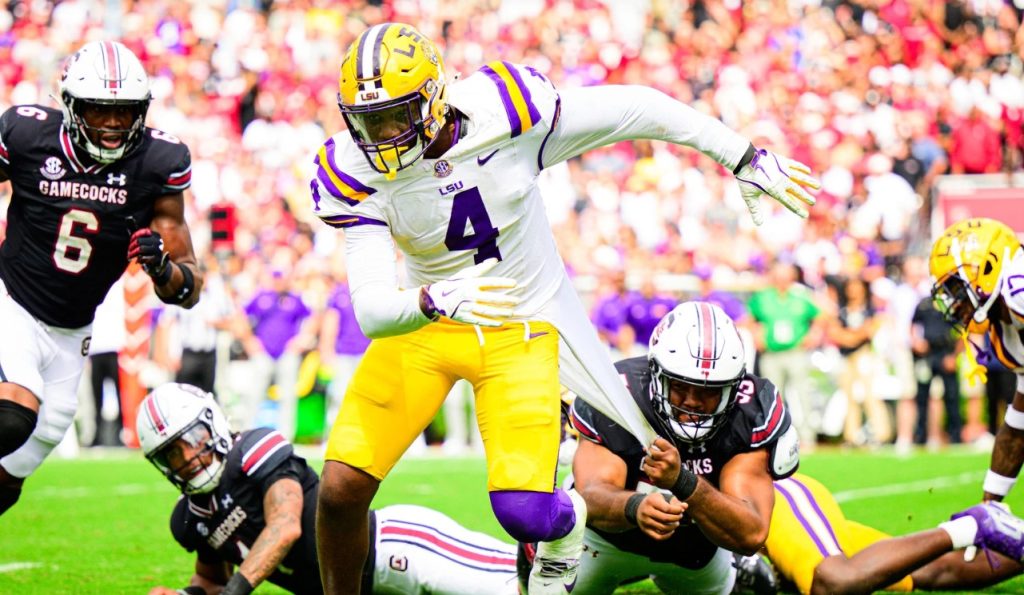
“As a team we came together as an offense and a defense,” defensive end Bradyn Swinson said last Tuesday. “You saw late in the game – when the offense was up, the defense was right there with them. When the defense was up, the offense was up there with us.”
Yes, for the first time last week, LSU played complementary football. That’s progress, and it also can’t happen without some connectivity.
“It was a connected thing,” Swinson said. And he wasn’t asked if LSU was disconnected by a reporter following up on Talty’s piece. The question was a general one about the defense. He said that probably with no idea of the piece. And he said this, too:
“We’re a real connected team. Everything’s starting to get together piece by piece. So, when things get bad (17-0 deficit in the second quarter at South Carolina), we don’t flinch. We just go out there and attack.”
Sometimes multiple sources can be disconnected.

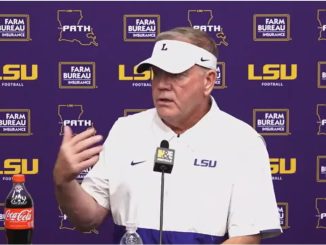
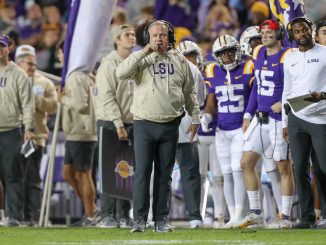
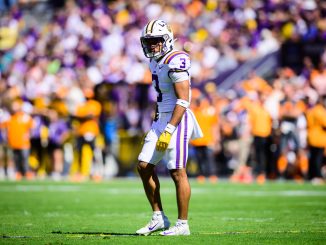
Be the first to comment